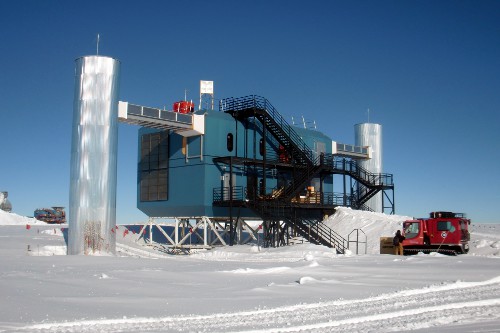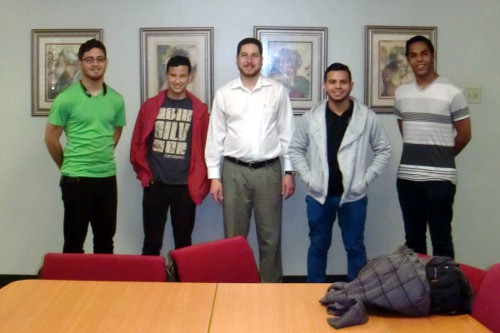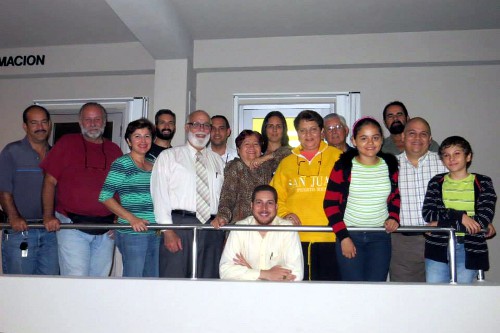I am now back and my adventure has just begun, as I start sharing my experience with students, fellow teachers and the community. I am already seeing the fruits as I watch my own students picking up an interest in high-energy astronomy and polar exploration. I sincerely hope a number of them will eventually follow careers in science and do even better things than what I did.
 January 12: The IceCube Laboratory (ICL) near the Amundsen-Scott South Pole Station.
January 12: The IceCube Laboratory (ICL) near the Amundsen-Scott South Pole Station.
 January 20: Selfie photograph at the South Pole, with the Antarctic plateau in the background.
January 20: Selfie photograph at the South Pole, with the Antarctic plateau in the background.
First of all, I would like to convey my heartfelt gratitude to four key persons: Janet and Sarah of PolarTREC (Alaska), as well as Jim and Megan at the IceCube main office (Wisconsin). In a very real way, I owe it all to them, and words will never be enough to thank them for providing me this opportunity to travel to the South Pole, the most remote spot on Earth. Janet, a program manager at ARCUS—a non-profit that manages PolarTREC—was the first person with whom I had contact, as early as September 2013. Sarah, also a program manager at ARCUS, and Jim, chair of the physics department at the University of Wisconsin–River Falls (and also the associate director of the IceCube project, where he leads the education and outreach team) came a bit later, between October and November 2013. Megan, an education and outreach coordinator for the Wisconsin IceCube Particle Astrophysics Center (WIPAC), also entered the scene around this time.
Jim: I am incredibly grateful and honored that you have given me the privilege of joining the IceCube team and working with the actual IceCube telescope at the South Pole. Honestly, I cannot think of an astronomy experiment that conveys more wonder and excitement than IceCube. I thoroughly enjoyed your visit to Puerto Rico in April-May 2014, and was again pleased to visit you in Wisconsin in July 2014. You (together with Megan) were the guiding force behind all of the planning—which went on for a full year—and you also provided valuable advice and direction, for which I will forever remain indebted. Thank you, Jim!
 May 1st, 2014: Jim Madsen lecturing at Pedro Rivera Molina school in Juncos, Puerto Rico, where I teach. Credit: Miguel Piñero.
May 1st, 2014: Jim Madsen lecturing at Pedro Rivera Molina school in Juncos, Puerto Rico, where I teach. Credit: Miguel Piñero.
 July 10, 2014: Upward Bound Summer program at the University of Wisconsin–River Falls. Credit: Katherine Shirey.
July 10, 2014: Upward Bound Summer program at the University of Wisconsin–River Falls. Credit: Katherine Shirey.
Janet: I always recall when you encouraged me to apply back in September 2013 and I totally appreciate it. You were also extremely helpful when I visited Fairbanks in February 2014, and I thank you for that. I have very happy memories of that trip.
Sarah: You called me to break the news of my selection on Thanksgiving eve (November 2013), and that made for my best Thanksgiving celebration ever. And I am also grateful that you patiently guided me through each step of the PolarTREC process through an entire year.
Zeb and Ronnie, information technicians at PolarTREC, provided prompt assistance with technical issues. On the IceCube side, Silvia and Jim (Haugen) have been particularly helpful throughout the whole project, while Lauren and Jean have provided material for WIPAC News. Elaine from Antarctic Support Contract and Joshua from BCD Travel were pivotal people, and my journey would not have come to fruition without their assistance. In addition, fellow PolarTREC participants and alumni such as John, Michelle, Susan, Lisa, Peggy, Lucy, Lollie and Yamini—who I actually met while in Antarctica—have all been an inspiration. I also met Dr. Pettit from the University of Alaska–Fairbanks, who aptly suggested that I could help encourage high school girls from Puerto Rico to apply to the Girls on Ice program, which I enthusiastically did starting the same day I returned to the island, on January 26.
My gratitude also goes to the members of the IceCube team that I encountered at the Amundsen-Scott South Pole Station: Mike, Elisa, Marcel, Lionel, James, Hans, Stephan and Sam. Mike—my on-site supervisor—was particularly friendly and welcoming, and I thoroughly enjoyed his keen sense of humor. I spent lots of time with Sam, who always took the time to explain everything with great detail. Elisa provided technical details on IceTop, while Stephan was instrumental in preparing for the IceCube webcasts. Hans and James were helpful in many ways, especially while in McMurdo and New Zealand. During my stay in McMurdo I encountered Katy, who in turn introduced me to Lisa (a program director at the National Science Foundation, who has been following my PolarTREC journals) and Erika (an Einstein Distinguished Educator fellow). I would also like to thank webcast attendees Rachelis and Amarilis (who each brought their own student cohorts), Ruth from the Arecibo Observatory in Puerto Rico, and the Hon. Ángel R. Peña-Ramírez of the Puerto Rico House of Representatives.
 February 3, 2015: Back at the classroom. Undergraduate astronomy class at the Seminary.
February 3, 2015: Back at the classroom. Undergraduate astronomy class at the Seminary.
 February 3, 2015: Seminarians taking this semester's astronomy course.
February 3, 2015: Seminarians taking this semester's astronomy course.
My employers have all consistently supported my participation with PolarTREC from the beginning. I am particularly grateful to the following individuals: Gretchen and Carlitos (both of G Works), school administrators Yadira and Miguel (from Pedro Rivera Molina middle school, where I teach), fellow teachers Lymari, Shirley and Yobán, and outstanding students like Kiany, Antonio, Jan, Rocío, Nashaley and many others. Sandra (from Alfonso Díaz Lebrón middle school, where I teach summer classes). María and Jennifer (from Metropolitan University's Center for Sustainable Development Studies, where I teach), as well as my full student body, but notably Nelson, Lyzzette and Osvaldo. Fr. Juan L., Fr. Iván and Maritza from the Seminary—where I started my teaching career—and in particular my students from this semester's undergraduate astronomy class: Emmanuel, Edwin O., Jorge and Guevnex.
The Puerto Rico Astronomy Society (PRAS) assisted in many ways including public relations, event hosting and arranging a magazine cover. A number of people there have been supportive in one way or another, such as Rubén and wife Alicia, Greg, Víctor, Natalia, José (Colom), José (Candelaria), Carmen, Héctor and wife Jomary, Juan V. and Dr. Peña-Hevia (from UPR-Río Piedras). Jacqueline and Digna, both of the Puerto Rico Science Teachers Association, and Genoveva, a good friend from academia, were among the early group of people who knew about my application to and selection by PolarTREC, back in 2013. Antonio Molina, founder and president of the UNESCO Center for Culture (i.e., Puerto Rico UNESCO Association), and Joseph Bergkamp of the Knights of Columbus—both good friends and mentors—have provided outstanding wisdom, encouragement and moral support.
 September 30, 2014: Teaching an astronomy class at Metropolitan University.
September 30, 2014: Teaching an astronomy class at Metropolitan University.
 May 20, 2014: Astronomy students at Metropolitan University.
May 20, 2014: Astronomy students at Metropolitan University.
Other people lent their expertise with writing and media engagement. Laurel (formerly of the Wisconsin IceCube Particle Astrophysics Center) did an amazing interview with me, which is available at: http://wipac.wisc.edu/news/view/215. Deborah wrote a press release back in March 2014, which became the first public announcement of my South Pole expedition. This release was very successful and yielded over 40 media hits, including two television interviews. I am also grateful to all who have followed my PolarTREC journals, and in particular those faithful readers of my daily posts like Rubén, Lymari, Willie (from Vega Baja, Puerto Rico), Carlos F. (from Panama) and Anne (from Belgium).
Several health providers were involved with my medical pre-qualification (PQ) process. I would like to thank the good people at the Members Office (i.e, Oficina de Socios) at Auxilio Mutuo Hospital—without a doubt, the island's most advanced and comprehensive medical facility—who arranged lab tests and immunization. I am particularly indebted to Dr. Aponte (dentist) and Dr. Romero (physician), both of Concilio de Salud Integral de Loíza—a federally qualified health center—who each saw me twice and took care of the extensive medical and dental paperwork that was required. Wilnelia and Migdalia (both at the reception desk) as well as Mr. Rodríguez-Román (executive director) were also helpful.
Above all, I would like to thank my mother Carmencita and my father Armando who were my biggest supporters from the beginning. They were the very first teachers of my life, who taught me to aim high and settle for nothing less than the best. I am fortunate to still have them both. My gratitude also goes to my two brothers Carlos R. and Jorge A., and to all relatives and good friends who in one way or another have conveyed their support and good wishes. Many have followed this project from day one and have stayed abreast via PolarTREC's website or via social media. They are too numerous to mention here, but my sincere appreciation goes to each and every one of them.
Finally and most important, I am grateful to all those who prayed for a successful expedition. The Almighty was there all along the way, working behind the scenes and ensuring everything ran like clockwork.
 February 1st, 2015: Together with Rubén (left) and Víctor (right) at a Puerto Rico Astronomy Society gathering. Credit: Rubén Miranda.
February 1st, 2015: Together with Rubén (left) and Víctor (right) at a Puerto Rico Astronomy Society gathering. Credit: Rubén Miranda.
This concludes my PolarTREC journals, but in no way implies the end of my commitment to PolarTREC and IceCube. I possess a significant amount of unpublished material which I plan to review and edit for possible future release. I also have pending presentations and media interviews on my South Pole expedition and my work at the IceCube Neutrino Observatory. For information on these developments stay tuned to the following websites:
PolarTREC homepage for my IceCube expedition: http://www.polartrec.com/expeditions/ice-cube-neutrino-observatory-2014
Wisconsin IceCube Particle Astrophysics Center: http://wipac.wisc.edu/
Puerto Rico Astronomy Society: http://www.astronomiapr.org/
LinkedIn: http://pr.linkedin.com/in/armandocaussade/


Comments